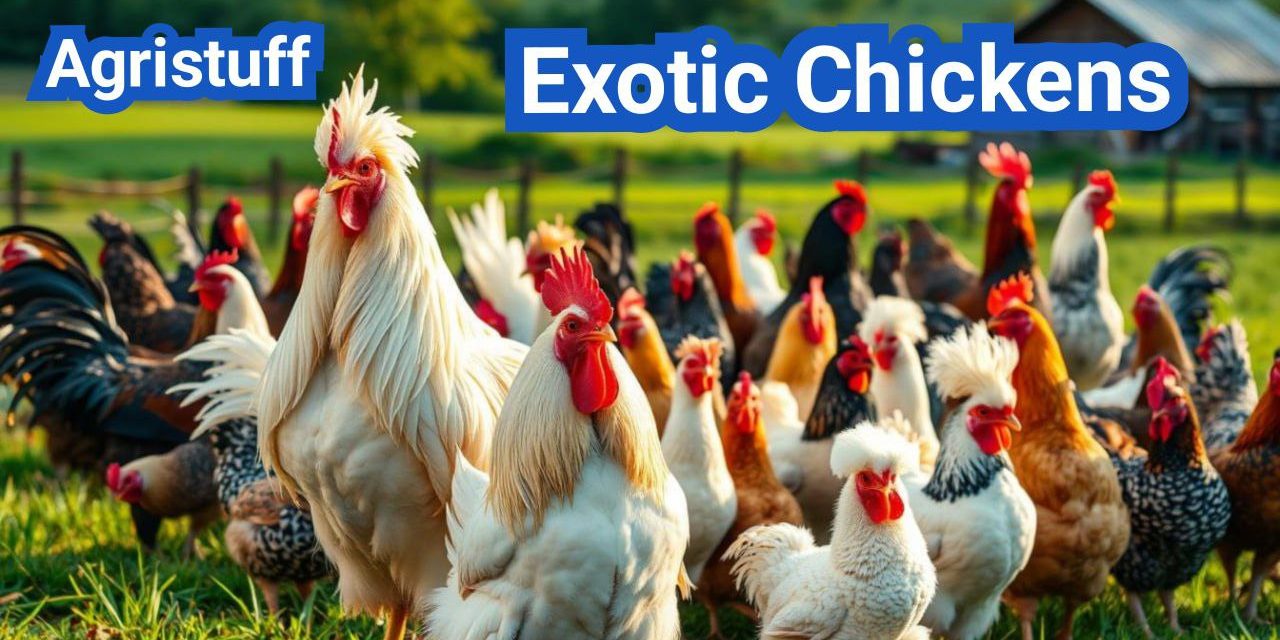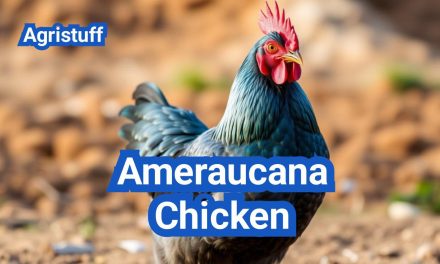Backyard poultry farming has taken a fascinating turn with the introduction of exotic chicken breeds. These unique birds are not only a delight to behold but also bring a touch of elegance to any farm.
The growing popularity of rare and fancy chicken breeds can be attributed to their distinctive characteristics and beauty. From vibrant plumage to intriguing behaviors, these beautiful chickens are a joy to raise.
Whether you’re a seasoned farmer or just starting out, incorporating these stunning poultry breeds into your backyard farm can be a rewarding experience. They add a unique charm and can become a great conversation starter.
Key Takeaways
- Exotic chicken breeds are gaining popularity among backyard farmers.
- These breeds offer unique characteristics and beauty.
- Raising exotic chickens can be a rewarding experience.
- They add elegance and charm to any farm.
- Fancy chicken breeds are known for their vibrant plumage.
What Are Exotic Chickens? Understanding Ornamental Poultry
Ornamental poultry enthusiasts often seek out exotic chickens for their extraordinary looks and traits. These unique birds have gained popularity among backyard farmers and poultry aficionados alike, not just for their stunning appearances but also for their distinct characteristics.
Defining Characteristics of Exotic Chicken Breeds
Exotic chickens are known for their unique physical characteristics, which can include fluffy feathers, crested heads, and a wide range of colors and patterns. These characteristics set them apart from more common chicken breeds and make them highly sought after by collectors and enthusiasts.
The diversity in appearance among exotic chickens is vast, with breeds displaying everything from silky feathers to elaborate crests. This variety not only adds visual interest to any farm or backyard but also provides a fascinating glimpse into the genetic diversity of chickens.
The Growing Popularity of Ornamental Poultry
The popularity of exotic chickens has been on the rise, driven in part by the growing interest in backyard farming and sustainable living. As people become more interested in where their food comes from and how it’s produced, the appeal of raising unique and ornamental poultry has grown.
Furthermore, the growing community of poultry enthusiasts has created a supportive environment for those interested in raising exotic chickens. This community shares knowledge, resources, and experiences, making it easier for newcomers to get started.
Differences Between Exotic, Fancy, and Heritage Breeds
While the terms “exotic,” “fancy,” and “heritage” are often used to describe unique or special chicken breeds, they have distinct meanings. Exotic chickens are typically characterized by their rare or unusual appearance. Fancy chickens are bred for their show quality and often have elaborate plumage or other distinguishing features. Heritage breeds, on the other hand, are traditional breeds that have been around for centuries and are valued for their historical significance and genetic purity.
Understanding these differences is crucial for anyone looking to add exotic chickens to their flock, as it helps in selecting breeds that fit their goals, whether those goals are related to showing, breeding, or simply enjoying the unique qualities of these birds.
Top 10 Most Stunning Exotic Chicken Breeds

The world of exotic chickens is filled with a diverse array of breeds that are sure to captivate any poultry enthusiast. Exotic chicken breeds are prized for their unique characteristics, stunning appearances, and often, their rarity. Here, we will explore some of the most stunning exotic chicken breeds that can add elegance and fascination to any farm or backyard flock.
Ayam Cemani: The Mystical All-Black Marvel
The Ayam Cemani is one of the most striking exotic chicken breeds, known for its all-black features, including its feathers, beak, and internal organs. This breed from Indonesia is often referred to as the “Lamborghini of chickens” due to its rarity and unique appearance. The Ayam Cemani’s black coloration is due to a genetic condition known as fibromelanosis, which results in an overproduction of melanin.
Silkie Chickens: The Fluffy Favorites
Silkie chickens are another popular exotic breed, cherished for their fluffy, soft feathers that give them a teddy bear-like appearance. Their fur-like plumage, along with their gentle and friendly nature, makes them a favorite among backyard chicken keepers. Silkie chickens are also known for their unique egg-laying abilities and broodiness, often being used as surrogate mothers for other breeds.
Polish Chickens: The Crested Beauties
Polish chickens are a visually striking breed, easily recognizable by their crested heads. The crest, which can be quite large, gives them a distinctive and elegant appearance. Polish chickens come in a variety of colors and are known for their friendly, docile nature, making them a great addition to any flock.
Onagadori: The Long-Tailed Wonders
The Onagadori is a rare and exotic breed from Japan, known for its exceptionally long tail feathers, which can grow up to several feet in length. This breed is a marvel of nature and requires special care to maintain its impressive tail.
“The Onagadori’s long tail is not just a beauty trait; it’s a result of careful breeding and selection over centuries.”
The Onagadori is a true example of the beauty and diversity found among exotic chicken breeds.
Rare Heritage Breeds for the Serious Collector
Serious collectors often seek out rare heritage breeds that stand out for their distinct characteristics and historical significance. These breeds not only add diversity to a collection but also preserve genetic lines that might otherwise be lost.
Svart Hona vs. Ayam Cemani: Understanding the Differences
The Svart Hona and Ayam Cemani are two breeds known for their striking black features. While both are considered exotic and rare, they have distinct differences. Svart Hona, or Swedish Black Chicken, is known for its entirely black plumage, beak, and internal organs. Ayam Cemani, on the other hand, is an Indonesian breed that is not only black externally but also internally, including its bones and organs. Understanding these differences is crucial for collectors who want to ensure the authenticity of their breeds.
Dong Tao Chicken: The Dragon Chicken of Vietnam
The Dong Tao Chicken, also known as the “Dragon Chicken,” is a rare breed from Vietnam. It is characterized by its large size and unique scaly legs. This breed is highly valued for its meat, which is considered a delicacy in Vietnamese cuisine. Collectors are drawn to the Dong Tao for its rarity and cultural significance.
Scots Dumpy: The Short-Legged Wonder
The Scots Dumpy is an ancient breed known for its short legs and robust body. This breed has a unique appearance that sets it apart from other chickens. The Scots Dumpy is not only a rare find but also a hardy bird, adapted to the rugged climate of Scotland. Its history and resilience make it a prized addition to any collection.
La Fleche: The Devil’s Bird from France
La Fleche, or the “Devil’s Bird,” is a French breed recognized by its distinctive V-shaped comb. This breed is known for its dark, glossy plumage and is considered a dual-purpose bird, suitable for both eggs and meat production. La Fleche’s unique appearance and historical background make it a sought-after breed among serious collectors.
Bantam Exotic Chickens for Small Spaces

Bantam exotic chickens are the perfect choice for those who want to enjoy the beauty of poultry without needing a large area. These miniature marvels offer all the charm of their larger counterparts but in a compact package, making them ideal for small farms, backyards, or even urban settings.
Sebright Bantams: The Laced Beauties
Sebright bantams are renowned for their stunning laced plumage, which comes in gold and silver varieties. Their small size, coupled with their elegant appearance, makes them a favorite among poultry enthusiasts. Sebright bantams are relatively low-maintenance and can thrive in smaller spaces as long as they have adequate shelter and nutrition.
Japanese Bantams: The Upright Tail Carriers
Japanese bantams are known for their unique upright tails, which are a hallmark of the breed. They come in a variety of colors and are admired for their graceful demeanor. These bantams are friendly and can make great pets for those willing to provide the necessary care and attention.
Belgian d’Uccle Bantams: The Bearded Mille Fleur
Belgian d’Uccle bantams are celebrated for their beautiful beards and feathered feet. The mille fleur variety, with its intricate flower-like feather patterns, is particularly prized. These birds are not only visually stunning but also have pleasant temperaments, making them a joy to keep.
Dutch Bantams: The Miniature Classics
Dutch bantams are one of the oldest bantam breeds and are known for their compact size and robust health. They come in a range of colors and are valued for their eggs as well as their ornamental value. Dutch bantams are hardy and can adapt well to various environments, making them suitable for different climates.
In conclusion, bantam exotic chickens like Sebright, Japanese, Belgian d’Uccle, and Dutch bantams offer a unique opportunity for those with limited space to enjoy the beauty and charm of poultry. By choosing the right bantam breed, backyard farmers can enhance their flocks without requiring extensive land.
Practical Exotic Chickens: Beautiful Breeds That Lay Well
For those seeking both beauty and functionality in their backyard flock, certain exotic chicken breeds stand out for their stunning appearance and impressive egg-laying abilities. These breeds not only add visual appeal to any flock but also contribute to its productivity.
Cream Legbar: The Blue Egg Layer
The Cream Legbar is a standout breed known for its striking appearance and ability to lay a significant number of blue eggs. Originating in Britain, this breed is not only a favorite among backyard flock owners for its egg-laying prowess but also for its friendly and curious nature.
Marans: The Chocolate Egg Layer
Marans chickens are renowned for their dark, chocolate-brown eggs, making them a unique addition to any flock. Their egg-laying ability, combined with their attractive feathering, has made them a popular choice among those who appreciate both form and function.
Welsummer: The Speckled Egg Layer
The Welsummer breed is cherished for its beautiful, terracotta-brown eggs speckled with darker brown spots. This breed’s eggs are not only a delight to collect but also a testament to the breed’s hardiness and productivity.
Olive Egger: The Green Egg Layer
Olive Egger chickens are a cross between a breed that lays blue eggs and one that lays brown eggs, resulting in a unique olive-green egg color. This breed combines the best of both worlds, offering not just a fascinating egg color but also a robust egg-laying capability.
These breeds exemplify the perfect blend of beauty and productivity, making them ideal for backyard flock owners who desire both the aesthetic appeal and the practical benefits of keeping exotic chickens.
How to Select the Right Exotic Chickens for Your Farm

To ensure a harmonious and thriving flock, it’s essential to select the right exotic chickens for your farm. The process involves several critical considerations that can significantly impact the success and enjoyment of your backyard poultry experience.
Assessing Your Space and Climate Compatibility
Before choosing exotic chicken breeds, it’s crucial to assess your farm’s space and climate compatibility. Different breeds have varying requirements for space, shelter, and climate tolerance. For instance, breeds with thick feathers or crests may struggle in extremely hot or humid climates, while those with sparse feathering might not do well in cold conditions.
Space considerations are also vital. Larger breeds or those with long tails require more room to roam and exercise. Ensure your coop and run are adequately sized to accommodate your chosen breeds comfortably.
Defining Your Goals: Eggs, Show, or Ornamental
Your goals for keeping exotic chickens will significantly influence your breed selection. Are you looking for egg production, or are you more interested in showing your birds? Perhaps you’re keeping them for their ornamental value or as pets.
Different breeds excel in different areas. For example, if you’re interested in eggs, breeds like the Cream Legbar or Marans might be suitable. For show or ornamental purposes, breeds like the Silkie or Polish could be more appropriate.
Temperament Considerations for Backyard Flocks
The temperament of your exotic chickens is another crucial factor. Some breeds are known for being friendly and docile, making them excellent choices for families or beginners. Others might be more aggressive or skittish.
When integrating new birds into your flock, it’s essential to consider their temperament to ensure a peaceful coexistence among all birds.
Budget Planning for Exotic Breeds
Exotic chicken breeds can vary significantly in price, depending on their rarity, size, and demand. It’s essential to set a budget and stick to it to avoid unexpected expenses.
Consider not only the initial cost of purchasing the birds but also ongoing expenses such as feed, healthcare, and potentially, show entry fees.
By carefully considering these factors—space and climate compatibility, personal goals, temperament, and budget—you can make informed decisions when selecting exotic chickens for your farm, ensuring a rewarding and enjoyable experience.
Finding and Purchasing Exotic Chickens in the USA

For those looking to add exotic chickens to their flock, the USA offers various avenues for sourcing these unique birds. Whether you’re a seasoned poultry keeper or a beginner, finding the right exotic chicken breed can be a rewarding experience.
Specialized Hatcheries for Rare Breeds
Specialized hatcheries are a great place to start your search for exotic chickens. These hatcheries often carry a wide range of breeds and can provide valuable advice on caring for your new birds. Some well-known hatcheries include Hatchery Choice and Meyer Hatchery, which offer a variety of exotic breeds.
| Hatchery Name | Breeds Offered | Location |
|---|---|---|
| Hatchery Choice | Ayam Cemani, Silkie, Polish | California |
| Meyer Hatchery | Sebright Bantam, Japanese Bantam, Belgian d’Uccle Bantam | Illinois |
Connecting with Reputable Breeders
Connecting with reputable breeders is another effective way to find exotic chickens. Breeders often specialize in specific breeds and can provide detailed information about the birds’ temperament, egg-laying abilities, and other characteristics. The American Poultry Association is a valuable resource for finding reputable breeders across the USA.
Poultry Shows as Sourcing Opportunities
Poultry shows are not only a great place to see exotic chickens in person but also an opportunity to network with breeders and learn more about the different breeds. Events like the International Poultry Expo and the National Poultry Show attract breeders and enthusiasts from across the country.
Online Resources and Communities
Online forums and social media groups dedicated to poultry keeping are also valuable resources for finding exotic chickens. Websites like Backyard Chickens and poultry-keeping forums on Reddit can connect you with other enthusiasts and breeders.
By exploring these options, you can find the perfect exotic chicken breed to add to your flock. Remember to research the specific needs of the breed you’re interested in to ensure you can provide the best care.
Creating the Ideal Habitat for Exotic Chickens

The right habitat is essential for the survival and prosperity of exotic chicken breeds. Exotic chickens have specific needs that must be met to ensure their health and well-being. “A well-designed habitat is crucial for the happiness and productivity of your flock,” as noted by poultry experts.
Coop Design Considerations for Specialty Breeds
When designing a coop for exotic chickens, several factors must be considered. The coop should provide adequate ventilation, protection from predators, and sufficient space for the chickens to roost comfortably. For instance, breeds with crested heads, like the Polish chicken, require additional headroom to prevent injury.
Key considerations include:
- Adequate ventilation to prevent respiratory issues
- Robust construction to protect against predators
- Enough space for chickens to stand and move around
Run and Free-Range Requirements
Exotic chickens also need a safe and healthy area to exercise. The run should be securely fenced to prevent escape and predation. Free-ranging can be beneficial, allowing chickens to forage for natural foods, but it requires careful supervision.
As Backyard Chickens magazine notes, “Free-ranging can significantly improve the health and happiness of your flock by providing them with a varied diet and exercise.”
Special Housing Needs for Crested and Feather-Footed Breeds
Certain exotic breeds, such as Silkies and Polish chickens, have special housing needs. Crested breeds require protection for their crests, while feather-footed breeds need clean, dry conditions to prevent health issues.
| Breed Type | Special Needs |
|---|---|
| Crested Breeds | Protection for crests, extra headroom |
| Feather-Footed Breeds | Clean, dry conditions, regular grooming |
Climate Control for Sensitive Varieties
Some exotic chicken breeds are sensitive to extreme temperatures. Providing adequate shelter and climate control measures, such as shading in summer and heating in winter, is crucial for their survival.
Climate control tips:
- Provide shading to prevent heat stress
- Use heating elements for cold climates
- Ensure good ventilation to prevent moisture buildup
Specialized Care for Exotic Chicken Breeds

Caring for exotic chickens demands attention to their unique needs. Exotic chicken breeds, such as Silkies, Polish, Ayam Cemani, and long-tailed breeds, require specialized care to thrive.
Caring for Silkies: The Special Needs Breed
Silkie chickens are known for their fluffy feathers and gentle nature. However, their unique characteristics require special care. Their feathers need regular grooming to prevent matting, and they are more susceptible to cold weather due to their lack of typical chicken feathers.
Tips for Silkie Care:
- Regular grooming to prevent feather matting
- Protection from extreme weather conditions
- Adequate nutrition to maintain their unique feather quality
Managing Polish Chickens’ Crests
Polish chickens are admired for their crested heads, which require special attention. The crest can obstruct their vision, making them more vulnerable to predators.
Care Tips for Polish Chickens:
- Regular cleaning of the crest to prevent dirt accumulation
- Protection from predators due to limited visibility
- Safe housing to prevent injury from their crests
Maintaining Ayam Cemani’s Black Features
Ayam Cemani chickens are prized for their all-black appearance, including their feathers, beak, and internal organs. Maintaining their unique black features requires attention to their diet and health.
Nutritional Tips for Ayam Cemani:
- A balanced diet rich in nutrients
- Adequate health checks to prevent disease
- Proper living conditions to maintain their overall health
Caring for Long-Tailed Breeds
Long-tailed chicken breeds, such as the Onagadori, are known for their extraordinary tail lengths. Caring for these breeds requires special consideration for their tail feathers.
Care Tips for Long-Tailed Breeds:
- Proper perches to prevent tail damage
- Regular grooming to maintain tail health
- Safe housing to protect their long tails
By understanding and meeting the specialized needs of these exotic chicken breeds, owners can ensure their health and happiness.
Nutrition and Feeding Guidelines for Exotic Breeds

To keep exotic chickens thriving, it’s crucial to understand their specific dietary requirements and feeding guidelines. Exotic chickens have unique nutritional needs that vary by breed, and meeting these needs is essential for their health and vitality.
Special Dietary Requirements by Breed Type
Different exotic chicken breeds have distinct dietary requirements. For instance, breeds with heavy feathering, such as Silkies or Polish chickens, may require additional protein to maintain their plumage. On the other hand, breeds like the Ayam Cemani may benefit from diets rich in certain nutrients to enhance their characteristic black features.
- High-protein diets for feather-intensive breeds.
- Calcium supplements for strong eggshell production.
- Vitamin D for overall health and egg production.
Supplements for Optimal Feather Quality and Color
Supplements can play a crucial role in enhancing the feather quality and color of exotic chickens. For example, marigold extract can intensify yellow pigmentation, while omega-3 fatty acids can improve overall feather health.
Feeding Schedules and Techniques
Establishing a consistent feeding schedule is vital for the health of exotic chickens. Free-choice feeding, where food is available at all times, can be beneficial for some breeds, while timed feeding may be more appropriate for others.
- Provide fresh water at all times.
- Offer a balanced diet that meets the breed’s specific needs.
- Monitor and adjust feeding schedules as necessary.
Water Requirements and Delivery Systems
Adequate water supply is critical for exotic chickens. Ensuring that water is clean, fresh, and easily accessible is essential. Consider using water delivery systems that minimize spillage and contamination.
By understanding and implementing these nutrition and feeding guidelines, you can help ensure the health and well-being of your exotic chickens.
Health Management for Exotic Chickens

Exotic chicken breeds are prone to specific health issues that need careful management. Their unique characteristics, such as crested heads or feathered feet, can make them more susceptible to certain health problems.
Common Health Issues in Specialty Breeds
Exotic chickens can be prone to various health issues, including respiratory problems, parasites, and reproductive issues. For example, breeds with crests, like Polish chickens, are more susceptible to head and eye infections due to their crested feathers obstructing their vision and trapping debris.
Respiratory issues are common in breeds with dense feathering or those that are prone to dust bathing. Regular cleaning of the coop and run can help mitigate these issues.
Preventative Care Protocols
Preventative care is crucial for maintaining the health of exotic chickens. This includes regular vaccinations, parasite control measures, and providing a clean and safe living environment.
- Regularly inspect your flock for signs of illness or stress.
- Implement a parasite control program to prevent infestations.
- Ensure the coop is well-ventilated and dry to prevent respiratory issues.
Finding Avian Veterinarians
Having access to an avian veterinarian is essential for the health of your exotic chickens. Not all veterinarians specialize in poultry, so it’s crucial to find one with experience in caring for exotic breeds.
Ask for referrals from other poultry keepers or breeders to find a reliable avian veterinarian in your area.
Quarantine Procedures for New Birds
Quarantining new birds is a critical step in preventing the introduction of diseases into your existing flock. A quarantine period of at least 30 days is recommended.
During this time, monitor the new birds for any signs of illness and ensure they are healthy before introducing them to your main flock.
Breeding and Hatching Your Own Exotic Chickens

The art of breeding exotic chickens involves not just passion, but also a deep understanding of genetics and poultry care. To successfully breed and hatch these unique birds, one must be well-versed in the specific requirements of exotic chicken breeds.
Setting Up Breeding Pens
Creating an appropriate environment for breeding is crucial. Breeding pens should be spacious enough to accommodate the birds comfortably, with adequate ventilation and protection from predators.
Key Considerations for Breeding Pens:
- Size: Ensure the pen is large enough for the birds to move freely.
- Security: Protect the birds from predators with sturdy fencing and secure roofing.
- Health: Maintain cleanliness and provide adequate nesting boxes.
Incubation Techniques for Rare Breeds
Incubation is a critical phase in the breeding process. Using the right incubation techniques can significantly improve hatch rates.
Incubation Best Practices:
| Incubation Parameter | Recommended Setting |
|---|---|
| Temperature | 99.5°F |
| Humidity | 50-60% relative humidity |
| Turning | 3-5 times daily |
Brooding Special-Needs Chicks
After hatching, brooding is essential for the survival and health of the chicks. Special-needs chicks, such as those with physical deformities or from rare breeds, require extra care.
Tips for Brooding:
- Provide a warm, draft-free environment.
- Ensure access to fresh water and starter feed.
- Monitor health closely, especially for special-needs chicks.
Record Keeping for Breeding Programs
Maintaining detailed records is vital for the success of any breeding program. This includes tracking lineage, health issues, and breeding outcomes.
Record Keeping Essentials:
- Pedigree records to track lineage.
- Health records to monitor disease incidence.
- Breeding outcomes to assess the success of different breeding pairs.
Showing and Displaying Your Exotic Chickens
The art of showing exotic chickens involves a deep understanding of breed standards, meticulous grooming, and strategic presentation. For enthusiasts, exhibiting their birds is not just about competition; it’s an opportunity to showcase the unique qualities of their exotic chickens.
Preparing Birds for Exhibition
Preparing exotic chickens for a show requires a systematic approach. It begins with selecting healthy birds that closely match the breed standard. Conditioning is key; birds should be in top physical condition, with vibrant plumage and alert demeanor.
Training is also crucial. Birds should be accustomed to being handled and should remain calm in the presence of judges. Practicing handling and exposure to different environments can help reduce stress on show day.
Grooming Techniques for Show Birds
Grooming is an essential aspect of showing exotic chickens. Techniques vary by breed, but common practices include:
- Preening and cleaning feathers
- Trimming beaks and nails
- Bathing and drying to enhance plumage
For breeds with crests or feathered feet, extra care is taken to prevent matting and to keep these features clean and well-maintained.
Understanding Breed Standards
Breed standards are the benchmarks against which birds are judged at poultry shows. Understanding these standards is vital for success. The American Poultry Association (APA) is a primary resource for breed standards in the United States.
“The APA Standard of Perfection is the definitive guide for poultry breeders and judges, outlining the characteristics of each recognized breed.”
Studying the breed standard for your specific breed can help you identify areas for improvement and guide your breeding and grooming decisions.
Finding and Entering Poultry Shows
Poultry shows are held throughout the year across the United States. Finding the right show involves considering factors like location, the prestige of the show, and the specific breeds featured.
| Show Type | Location | Frequency |
|---|---|---|
| Local Poultry Shows | Varies | Annual or Biannual |
| National Poultry Shows | Major cities | Annual |
| Specialty Breed Shows | Varies | Annual or Biannual |
Entering a show involves registering your birds in advance and preparing the necessary documentation, such as proof of ownership and health certificates.
Overcoming Challenges in Raising Exotic Chickens
The allure of exotic chickens is undeniable, yet their upkeep poses significant challenges for many poultry keepers. As beautiful as they are, exotic chickens require special attention and care to thrive.
Managing Higher Maintenance Requirements
Exotic chickens often have higher maintenance needs compared to more common breeds. This can include more frequent grooming, special dietary requirements, and increased health checks. For instance, breeds like the Silkie require regular grooming to prevent matting of their feathers, while others like the Ayam Cemani may need specific nutritional supplements to maintain their distinctive black features.
- Regular grooming for breeds with crests or feathered feet
- Specialized nutrition for optimal health and color
- Frequent health checks to catch issues early
Addressing Genetic Issues in Rare Breeds
Genetic issues can be a significant challenge when raising exotic chickens, particularly for rare breeds. Inbreeding can lead to health problems and reduced fertility. It’s crucial to work with reputable breeders who prioritize genetic diversity and to maintain detailed breeding records.
Key strategies include:
- Diversifying breeding stock
- Maintaining detailed breeding records
- Participating in breed clubs and genetic research
Climate Adaptation Strategies
Exotic chickens may not be adapted to the local climate, requiring additional measures to ensure their comfort and health. This can involve providing climate-controlled housing, adjusting their diet according to the season, and ensuring adequate ventilation.
- Providing shade and cooling measures for hot climates
- Insulating coops for colder climates
- Adjusting feeding schedules according to seasonal changes
Cost Management for Expensive Breeds
Exotic chickens can be costly to purchase and maintain. Effective cost management involves planning for the initial purchase, ongoing care, and potential veterinary expenses. It’s also wise to consider the cost of replacement birds and the potential for loss due to predation or disease.
To manage costs effectively, consider:
- Budgeting for initial purchase and setup
- Planning for ongoing expenses like feed and healthcare
- Exploring insurance options for your flock
The Rewarding World of Exotic Chicken Keeping
Keeping exotic chickens can be a truly rewarding hobby, offering a unique connection with these fascinating birds. The experience of raising exotic chickens not only brings joy but also provides an opportunity to engage with nature and appreciate the beauty of these specialty breeds.
The rewards of keeping exotic chickens are numerous, from the pleasure of watching them roam and interact to the satisfaction of showcasing them at poultry shows. Whether you’re drawn to the Ayam Cemani’s mystical appearance or the Silkie’s fluffy charm, each breed offers a distinct experience that enriches the hobby of exotic chicken keeping.
As you’ve learned throughout this article, from selecting the right breeds to understanding their specialized care needs, the world of exotic chicken keeping is rich with opportunities for education and enjoyment. By embracing the challenges and rewards that come with raising these unique birds, enthusiasts can create a fulfilling and engaging hobby that brings years of pleasure.
FAQ
What are exotic chickens?
Exotic chickens refer to rare and unusual breeds that are prized for their unique characteristics, such as their appearance, egg-laying abilities, or temperament.
What are the differences between exotic, fancy, and heritage breeds?
Exotic breeds are rare and unusual, fancy breeds are known for their aesthetic appeal, and heritage breeds are traditional breeds that have been around for a long time and are valued for their historical significance.
Are exotic chickens hard to care for?
Some exotic chickens require specialized care, such as Silkies or Polish chickens, which need extra attention to their crests or feathered feet, but many can thrive with proper care and management.
Can exotic chickens make good pets?
Yes, many exotic chickens can make great pets, as they are often friendly, curious, and entertaining to watch, but it’s essential to research their specific needs and temperaments.
Do exotic chickens lay eggs?
Yes, many exotic chickens are good egg layers, such as the Cream Legbar, Marans, or Welsummer, but some breeds, like the Ayam Cemani, may not be as prolific in their egg-laying.
How do I find reputable breeders of exotic chickens?
You can find reputable breeders by attending poultry shows, joining online forums or breed clubs, or searching for breeders through national or local poultry associations.
What are the most common health issues in exotic chickens?
Exotic chickens can be prone to various health issues, such as respiratory problems, parasites, or reproductive issues, so it’s crucial to work with a veterinarian experienced in caring for poultry.
Can I show my exotic chickens?
Yes, many exotic chickens can be shown at poultry exhibitions, but it’s essential to research the breed standards and show rules to ensure your birds meet the necessary criteria.
How do I care for the unique features of exotic chickens, such as crests or feathered feet?
Caring for the unique features of exotic chickens requires attention to their specific needs, such as regular grooming, protection from the elements, and proper nutrition.
Are exotic chickens expensive?
Some exotic chickens can be quite expensive, especially rare or unusual breeds, but prices vary depending on factors like breed, age, and quality.
Can beginners keep exotic chickens?
While it’s possible for beginners to keep exotic chickens, it’s essential to research their specific needs and challenges before deciding to bring them home.
How do I introduce new exotic chickens to my existing flock?
Introducing new exotic chickens to your existing flock requires careful planning, including quarantining the new birds, gradual introduction, and monitoring their behavior to prevent stress and conflict.
Conclusion of: Exotic Chickens
If you’re looking to add a splash of color, charm, and uniqueness to your backyard flock, Exotic Chickens might be the perfect choice. In the world of poultry, Exotic Chickens stand out for their unusual plumage, rare heritage, and striking personalities. These breeds not only elevate the visual appeal of your farm but also serve as conversation starters and valuable additions for poultry enthusiasts. Whether you’re a seasoned farmer or a beginner exploring the world of poultry, understanding Exotic Chickens can transform your experience into something vibrant and meaningful. Learn more about poultry breeds from the American Poultry Association.
Let’s dive into the fascinating world of Exotic Chickens and learn how they can enrich your farming journey in the USA.
Understanding What Makes Exotic Chickens Unique
Exotic Chickens refer to rare and visually stunning poultry breeds that differ significantly from common commercial varieties. They are known for flamboyant feathers, unique combs, unusual body shapes, and sometimes extraordinary behaviors. These birds often come from specific genetic lines or originate from remote regions, and many of them are preserved today for their cultural, historical, or ornamental value. Discover rare chicken breeds through the Livestock Conservancy.
From long, flowing tails to iridescent plumage and bold color contrasts, Exotic Chickens are truly living artwork. Their diversity makes them an attractive option for poultry keepers who value aesthetics as much as egg production or meat.
Popular Exotic Chickens in the USA
The USA has seen growing interest in Exotic Chickens as part of backyard farms and homesteads. Some of the most admired breeds include:
Silkie
One of the most popular Exotic Chickens in America, Silkies are adored for their fluffy, hair-like feathers and calm temperament. Their gentle nature makes them perfect for families with children. Their soft, satin-like texture and black skin make them an exotic sight in any flock. Read about Silkie chickens from University of Florida Extension.
Ayam Cemani
Often called the “Lamborghini of poultry,” the Ayam Cemani is among the most visually dramatic Exotic Chickens. Native to Indonesia, this breed is entirely black—feathers, beak, skin, and even internal organs—thanks to a rare genetic trait known as fibromelanosis.
Polish Chicken
Recognizable by its large, feathered crest that sometimes covers the eyes, the Polish Chicken is both entertaining and elegant. These Exotic Chickens bring both aesthetic flair and moderate egg-laying ability to any farm.
Sebright
This small, ornamental breed is prized for its delicate lacing patterns and bright, shimmering feathers. As one of the oldest true bantam Exotic Chickens, Sebrights are excellent show birds and add sparkle to any flock.
Phoenix Chicken
Known for its long, flowing tail feathers that can reach several feet, the Phoenix breed brings exotic elegance to any setup. Originating from Japan and Germany, these Exotic Chickens require spacious coops and good care but reward keepers with unmatched beauty. Learn about long-tailed chickens from Penn State Extension.
Why Choose Exotic Chickens for Your Farm?
Raising Exotic Chickens isn’t just about beauty—it’s about biodiversity, sustainability, and passion for poultry keeping. These breeds often have rich histories, making them a joy for hobbyists and educators alike. Here are some reasons why adding Exotic Chickens to your farm is a rewarding idea:
- Enhance Aesthetic Appeal
Exotic Chickens are simply beautiful. Their vivid colors, elegant posture, and rare features attract attention and admiration, turning a simple backyard coop into a showcase. - Educational Value
For families, schools, or community farms, Exotic Chickens serve as living lessons. Learning about their origins, genetics, and behaviors can offer deep insights into biology and agriculture. Find educational resources at USDA National Agricultural Library. - Support for Rare Breeds
By raising Exotic Chickens, you contribute to the preservation of endangered poultry breeds. Many of these birds are on watch lists, and small-scale keepers play a big role in keeping their lines alive. - Show and Exhibition Potential
Many Exotic Chickens are ideal for poultry shows and competitions. Their beauty and rarity make them stand out in exhibitions, often earning ribbons and recognition. - Gentle Personalities
Despite their unique appearances, many Exotic Chickens—like Silkies and Polish—are known for being docile and friendly. They integrate well into mixed flocks and are easy to manage.
Challenges of Raising Exotic Chickens
While Exotic Chickens bring undeniable appeal, they may require special care and attention compared to standard breeds. Understanding their needs ensures a healthier, more rewarding experience.
- Special Housing Needs
Some Exotic Chickens have long feathers or crests that make them sensitive to wet or muddy environments. A dry, clean coop is essential for their health. - Vulnerability to Predators
Due to their calm nature and elaborate plumage, Exotic Chickens may be more vulnerable to predators. Adequate fencing and nighttime shelter are crucial. Learn about predator protection from Cornell Cooperative Extension. - Variable Egg Production
Unlike commercial layers, many Exotic Chickens don’t produce eggs in high quantities. If egg production is a top priority, you may need to balance exotic breeds with productive ones. - Cost and Availability
Acquiring Exotic Chickens can be more expensive. Rare breeds often come at a premium, especially with limited breeders in certain regions.
Caring for Exotic Chickens: Basic Tips
Here are a few tips to help keep your Exotic Chickens healthy and happy:
Clean Coops: Ensure dry bedding and regular cleaning to protect sensitive feathers.
Balanced Diet: Provide a nutrient-rich diet, especially for ornamental breeds with high feather density. Get feeding guidelines from Mississippi State University Extension.
Health Checks: Monitor for parasites or vision problems, especially in crested breeds.
Gentle Socialization: Handle them calmly and frequently, as Exotic Chickens are often bred for calm temperaments.
Exotic Chickens for Hobbyists and Small-Scale Farmers
Many small-scale American farmers are turning to Exotic Chickens for niche poultry farming. Whether selling fertilized eggs, participating in breed preservation, or attending shows, Exotic Chickens offer great side-income potential and community engagement opportunities.
If you’re looking to stand out at a local farmer’s market or attract farm visitors, showcasing Exotic Chickens can give you a unique edge. They provide marketing appeal that goes beyond function and taps into lifestyle branding for modern homesteads.
Integrating Exotic Chickens into Mixed Flocks
Exotic Chickens can live alongside common breeds, but it’s important to ensure compatibility. Larger, aggressive birds may pick on gentler exotics. Start by isolating new birds in a “quarantine coop” before integrating them, and observe behaviors carefully.
A diverse flock with Exotic Chickens can create a beautiful and balanced ecosystem in your backyard, but harmony comes from attentive flock management.
Breeding and Hatching Exotic Chickens
Breeding Exotic Chickens can be a fulfilling project. Many American hobbyists enjoy maintaining bloodlines or creating color-specific breeding programs. When breeding Exotic Chickens, select healthy parents with ideal breed characteristics, and use incubators or broody hens for hatching.
Pay close attention to genetics—some breeds require careful line-breeding to avoid health problems while preserving aesthetic traits. Learn about poultry genetics from University of California Agriculture.
How to Find Exotic Chickens in the USA
While availability varies by state, Exotic Chickens can be sourced from specialty hatcheries, poultry shows, or breed clubs. Look for NPIP-certified sellers (National Poultry Improvement Plan) when possible to ensure health standards.
Whether you’re sourcing day-old chicks, hatching eggs, or breeding pairs, always research and communicate clearly with breeders to understand the bird’s background and traits. Find certified hatcheries through the National Poultry Improvement Plan.
Final Thought
Exotic Chickens are more than just beautiful birds—they represent heritage, passion, and the artistic side of farming. From their mesmerizing looks to their peaceful personalities, Exotic Chickens bring something truly magical to any backyard flock or farm. While they may need extra attention and investment, the rewards are unmatched for those who appreciate poultry beyond practicality. If you’re ready to turn your coop into a vibrant and living masterpiece, Exotic Chickens are the perfect place to start. Explore more poultry resources at Poultry Hub.













